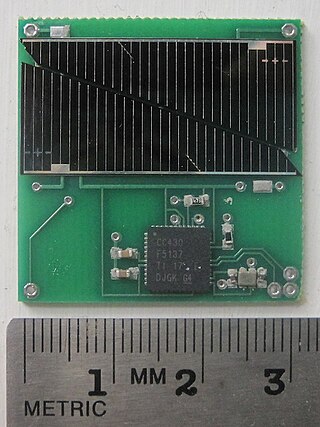
Thales Alenia Space is a joint venture between the French technology corporation Thales Group (67%) and Italian defense conglomerate Leonardo (33%). The company is headquartered in Cannes, France.

A space tug is a type of spacecraft used to transfer spaceborne cargo from one orbit to another orbit with different energy characteristics. The term can include expendable upper stages or spacecraft that are not necessarily a part of their launch vehicle. However, it can also refer to a spacecraft that transports payload already in space to another location in outer space, such as in the Space Transportation System concept. An example would be moving a spacecraft from a low Earth orbit (LEO) to a higher-energy orbit like a geostationary transfer orbit, a lunar transfer, or an escape trajectory.
The EELV Secondary Payload Adapter (ESPA) is an adapter for launching secondary payloads on orbital launch vehicles.

Secondary payload, also known as rideshare payload, is a smaller-sized payload transported to orbit on a launch vehicle that is mostly paid for—and with the date and time of launch and the orbital trajectory determined—by the entity that contracts and pays for the primary launch. As a result, the secondary payload typically obtains a substantially reduced price for transportation services to orbit, by accepting a trade off of the loss of control once the contract is signed and the payload is delivered to the launch vehicle supplier for integration to the launch vehicle. These tradeoffs typically include having little or no control over the launch date/time, the final orbital parameters, or the ability to halt the launch and remove the payload should a payload failure occur during ground processing prior to launch, as the primary payload typically purchases all of these launch property rights via contract with the launch services provider.

Planet Labs PBC is a publicly trading American Earth imaging company based in San Francisco, California. Their goal is to image the entirety of the Earth daily to monitor changes and pinpoint trends.
Satellogic Inc. is a company specializing in Earth-observation satellites, founded in 2010 by Emiliano Kargieman and Gerardo Richarte.
NanoAvionics Corp is a small satellite bus manufacturer and mission integrator founded as a spin-off from Vilnius University, Lithuania in 2014.

Firefly Alpha is a two-stage orbital expendable small lift launch vehicle developed by the American company Firefly Aerospace to compete in the commercial small satellite launch market. Alpha is intended to provide launch options for both full vehicle and rideshare customers.
SHERPA is a commercial satellite dispenser developed by Andrews Space, a subsidiary of Spaceflight Industries, and was unveiled in 2012. The maiden flight was on 3 December 2018 on a Falcon 9 Block 5 rocket, and it consisted of two separate unpropelled variants of the dispenser.

ÑuSat satellite series, is a series of Argentinean commercial Earth observation satellites. They form the Aleph-1 constellation, which is designed, built and operated by Satellogic.

Capella Space is an American space company with satellite and declassified SAR data solutions for government and commercial use. It offers space-based radar Earth observation satellites equipped with synthetic-aperture radar that can collect imagery through clouds and at night. The company is based in San Francisco, California with offices in Washington, D.C., and Louisville, Colorado. It was founded by Payam Banazadeh, a former engineer at Jet Propulsion Laboratory of NASA, and William Walter Woods.
Relativity Space Inc. is an American aerospace manufacturing company headquartered in Long Beach, California. Relativity Space is developing manufacturing technologies, launch vehicles, and rocket engines for commercial orbital launch services. The company is notable for manufacturing most of their Terran 1 and Terran R rocket parts using 3D printing. As of April 2024, Terran R is on track for initial launch in 2026.

TROPICS(Time-Resolved Observations of Precipitation structure and storm Intensity with a Constellation of Smallsats) is a NASA constellation of six small satellites, 3U CubeSats, that will measure temperature and moisture profiles and precipitation in tropical systems with unprecedented temporal frequency. This data will enable scientists to study the dynamic processes that occur in the inner core of the storm resulting in rapid genesis and intensification. William Blackwell of the Massachusetts Institute of Technology's Lincoln Laboratory in Lexington, Massachusetts is the principal investigator. The constellation was initially planned to be delivered to orbit on three launches between June and July 2022. Due to the loss of the first two satellites after a launch failure in June 2022, the first satellites were delivered to orbit aboard a Rocket Lab Electron rocket on 7 May 2023.
Jason Andrews is an American space and technology entrepreneur. He co-founded with his wife Marian Joh, Andrews Space in 1999, founded Spaceflight Inc. in 2010, BlackSky Global LLC in 2013, and integrated all three entities together in 2015 under Spaceflight Industries.
Exolaunch GmbH is a German launch services, mission management, and deployment systems provider based in Berlin, Germany. The company's main focus is the deployment of small satellites, ranging from CubeSats to microsatellites.
Spaceflight, Inc. is an American aerospace company based out of Seattle, Washington, that specializes in organizing rideshare space launches of secondary payloads. It was part of Spaceflight Industries until June 2020.
Swarm Technologies, Inc. is a company building a low Earth orbit satellite constellation for communications with Internet of things (IoT) devices using a store and forward design. Social Capital partners Jay Zaveri and Arjun Sethi incubated and seed funded Swarm, Craft Ventures was an early investor. On 16 July 2021 Swarm entered into an agreement to become a wholly owned subsidiary of SpaceX.

Photon is a satellite bus based on Rocket Lab's kick stage.







